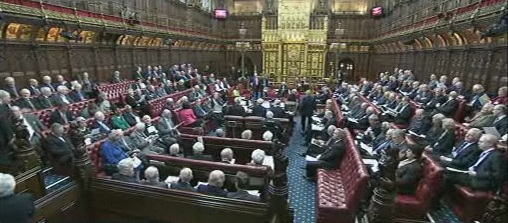The House of Lords: UKIP’s backdoor into Westminster

GE2015 could mark the end of peerage pensions for the Lib Dems
If the Commons was once considered “The best Club in London†then the Lords must these days be the best retirement home. The nature of the role is such that working peerages tend to be awarded to those whose first career has either ended entirely or is at least winding down – so allowing them the time to work in the Upper House, as well as having provided the evidence to justify the award. Add in that awards are for life and inevitably, they’re an aged bunch: a study two years ago revealed that more peers were over eighty years old than were under sixty.
One group that does particularly well for peerages is ex-MPs. Former cabinet ministers are almost guaranteed a peerage, for example. That’s understandable – they know the Westminster system and are reliable nominations as working peers without allegations of deals or shady rewards – though it might not do too much for diversity or introducing new thinking.
However, one group that doesn’t do at all well is supporters of minor parties: the Tories, Lib Dems and Labour parties enjoy the support of 95% of peers aligned to a party (and most of the rest were nominated by one of the same three parties before the peer resigned their whip, defected or were booted out of their party).Â
- That runs in conflict to the Coalition Agreement, which said that “in the interim [before reform of the Lords is passed], Lords appointments will be made with the objective of creating a second chamber that is reflective of the share of the vote secured by the political parties in the last general electionâ€.
The suggestion from the Agreement is that the principle applies to all parties; the appointments in practice suggest otherwise. If peers for minor parties had been created in line with the 2010 vote shares, there’d now be about 18 UKIP peers rather than three (all of which were defections), 11 for the BNP, five Greens rather than one, and an English Democrat. We might accept the exclusion of flash-in-the-pan parties, of those with very limited support or of those extreme views where it would be inappropriate grant full-life honours but UKIP doesn’t fall into any of those categories (nor do the Greens).
Instead of looking back to 2010, a more intriguing question arises looking forward past 2015. While the Coalition Agreement was only designed for one parliamentary term and is far from a constitutional principle, if UKIP were to poll at anything like current levels, it would be far harder to justify their continued exclusion from the Lords – even more so if they outpoll the Lib Dems into third. For example, were they to realise their current 12%, that would imply an entitlement to around seventy peers: a block that would have a transformative effect on the upper House.
The flip side is that the Lib Dems would be significantly over-represented if they can’t improve on the 10% they’ve been stuck on for over three years. That equates to around sixty members of the Lords, rather than the hundred or so they have now. Put another way, the retiring or defeated Lib Dem MPs next year might find it a lot harder to come by a peerage pension than their predecessors from earlier elections.
Would it happen? I’m highly sceptical. The Westminster parties have a vested interest in protecting the limited membership of their club and would no doubt claim that the Agreement was only ever meant to apply to parties with significant representation in the Commons, or that the principle it espouses isn’t a convention, or whatever other justification happens to fit the end result desired. And if there is some similar statement in another Agreement, you can bet it’ll be more tightly worded next time.